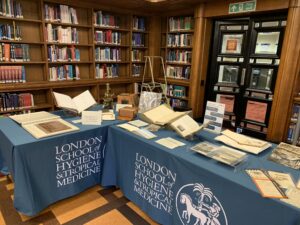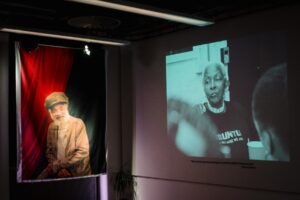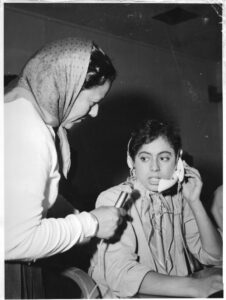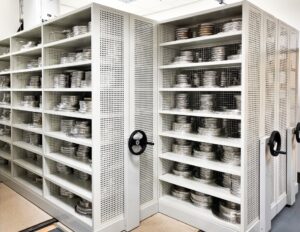Grants Awarded 2024
Grants Awarded 2023
Grants Awarded 2024
The Devonshire Collective
This Research and Innovation Grant will enable the Devonshire Collective CIC to develop critical new scholarship on the work and pedagogy of British artist and activist Tessa Boffin (1960 – 1993) through original archival research, artistic commissions and a UK-wide touring exhibition in 2026. Boffin was a lesbian photographer, writer, editor, and performance artist who died young and her work and legacy remain underexplored, despite potent resonances with contemporary identity politics. The Devonshire Collective’s research will be led by a team of diverse practitioners and will take Tessa Boffin’s own words as a starting point – as a teacher, observer, activist and campaigner. The archival research will culminate in a touring exhibition to Eastbourne, Nottingham and Portsmouth, bringing Boffin’s work to new audiences with a distinct pedagogical focus.
The project’s approach is not only to uncover and preserve Boffin’s work but also to reinterpret dominant narratives of art history. By examining her influence on both the visual arts and education, the team aims to reveal Boffin’s contributions to ongoing discourse around gender, sexuality, and activism. This project, through its touring exhibition and newly commissioned works, will be accessible across the UK, extending beyond the art world to engage local communities, marginalised voices, and those most affected by social inequality. By presenting Boffin’s work alongside contemporary artistic responses, they aim to inspire audiences to reflect critically on their own roles within social justice movements and encourage them to act. Through her legacy, the team seeks to create a platform where art is an active tool for change.
‘This project represents a transformative shift in our own curatorial practice, allowing our emerging curator to move beyond their usual day-to-day roles to engage in original scholarship with a national-level impact. By touring this material as exhibitions, we will reach new audiences and enhance how people interact with art history and archival materials. Our innovative engagement formats, intersectional scholarship, and expanded outreach will ensure that a broader and more diverse group of people can contribute to and access the field of art history. This project will leave a lasting legacy through stronger partnerships and increased institutional capacity to deliver high-impact, community-focused research.’ – Edward Ball, Director, Devonshire Collective

Image credit: Hales Gallery. Tessa Boffin, Untitled #4, 1989/2023.
London School of Hygiene and Tropical Medicine
The London School of Hygiene and Tropical Medicine (LSHTM) will use its grant to reframe access to its colonial medical photograph collections. Due to the collection’s sensitive nature, these photographs have remained hidden to researchers. However, LSHTM are looking to now make these records accessible in an appropriate way as part of their wider decolonising work.
The project will fund a consultant to work with the team to research the images, facilitate workshops with LSHTM staff and students to gain their views on the material, and produce a learning output for LSHTM and the wider archive community who hold similar material. The project will give LSHTM the opportunity to fully consider the impact of allowing access to this material and inform current practice on taking medical photographs.

Image credit: London School of Hygiene and Tropical Medicine
HOUSE OF DREAD
This Research and Innovation Grant will support HOUSE OF DREAD’s programme ‘Reasoning with the Archive’.
‘This support empowers us to continue our mission of preserving and celebrating the rich cultural heritage of our community. Through this funding, we aim to digitise and make accessible HOUSE OF DREAD’s oral history collection, inviting members of the community to explore the possibilities of the archive through words and sound. This opportunity strengthens our vision to ensure the voices and stories of underrepresented groups are documented and shared in meaningful ways and provides an important opportunity to connect, past and present through creative projects that inspire and educate future generations.’ – Dr Aleema Gray, Founder of HOUSE OF DREAD

Image credit: HOUSE OF DREAD
Grants Awarded 2023
Centre for Endangered Archaeology and Heritage
The Centre for Endangered Archaeology and Heritage, based at the University of Leicester, will use this funding to run an engagement project about the archive of the British Institute of Libyan and Northern African Studies. The project will work with Libyans in the UK and Libya, in order to better describe modern Libyan culture in the archive’s catalogue, and to share learning from the project with other archaeological archives and the sector more widely.
They plan to deliver, with Libyan partners, a series of small-scale, remote events in Arabic and English, each with a different theme. During the sessions, they will use digitised photographs from the archive to spark discussions with attendees. Sessions will aim to gather information about the content of the images, but will also encourage people to share their personal memories. Information and comments from attendees will later be added to the archive catalogue where appropriate.
The centre has chosen the themes for the first three sessions, in collaboration with Libyan partners. These sessions will explore Libyan clothing and its connotations in the 20th century, the significance of archaeological sites to people in Libya, and the identification of Libyan archaeologists. The themes of the final few sessions will be chosen by attendees of previous sessions.
They will use the experience of the project to write a guide for archaeological archives who are considering delivering similar sessions and will also deliver a day-long workshop in Leicester.
‘We are thrilled that our application has been successful. This project will allow us to try out new ways that we can include the perspectives of people in Libya and the Libyan diaspora in our archive metadata. We look forward to sharing our learning from the project with other archives.’ – Felicity Crowne, University of Leicester

Khadījah Jahamī, a famous and well-respected women in Libya and a television and radio presenter who used her position to advocate for women’s rights. Pictured here training a female telephone operator.
Bury Archives
Bury Archives is full of fascinating information that they want as many people as possible to know about. To increase people’s engagement with these collections they will be working with local artists to breathe new life into their collections. The outcome of this will be multiple creative digital publications, inspired by their collections, that will be freely available via Bury Libraries BorrowBox platform.
‘We are very happy to receive this funding which will allow us to make the most of our amazing collections and hopefully engage with a new audience in a new and exciting way’ – David Fielding, Deputy Head at Bury Libraries + Archives.

Bury Libraries + Archives
Newcastle University Special Collections
Newcastle University Special Collections will be working closely with Dr Lucy Havens to explore gender bias in their archival catalogues through the application of machine learning models. These models were originally created in collaboration with Edinburgh University’s Centre for Research Collections, and will be expanded to a new corpus at Newcastle University in conjunction with their Gender Research Group.
‘This is timely and important research for our sector, addressing curatorial practices to ensure equality, diversity, and inclusion is an embedded part of how we present archives to contemporary audiences. I am delighted that The National Archives has recognised the power for change that Dr Havens’ research has and how we can harness machine learning to this end.’ – Ian Johnson, Head of Special Collections and Archives

Sir Charles Philips Trevelyan and Mary Treveylan. Our Charles Philips Trevelyan Archive is significantly compiled, created, and annotated by Mary, but catalogue descriptions tend to focus on her husband.
Shakespeare Globe Theatre Trust
The Shakespeare’s Globe Research & Collections Centre will use its research and innovation grant to move forward with a project creating new resources for a wider range of users wanting to access the trust’s collections. They will be producing four subject guides to help researchers find race, gender, queerness and disability in our archive collections – topics that can’t easily be searched for through the archive catalogue. They will recruit an intersectional team of volunteers with lived experience across these areas to act as an inclusion advisory panel to help shape the final documents. Once the four guides are up and running, the team will update them annually with information from the Globe’s most recent seasons.
‘Shakespeare’s Globe’s mission is “Shakespeare for all”, and the new inclusive subject guides will help to bring our unrivalled heritage of performance and experimentation to an even wider audience. I’m thrilled that, with The National Archives’ support, the Globe’s Research & Collections Centre will be able to activate the stories and experiences that lie within our recordings, prompt books, show reports, digital records and performance ephemera.’ – Dr Will Tosh, Head of Research at the Shakespeare Globe

Shakespeare’s Globe Theatre, Shakespeare Globe Theatre Trust
Yorkshire and North East Film Archives
ReelAccess is a project by the Yorkshire and North East Film Archives to assess the potential of significantly increasing access to moving image archives for educational purposes. The initiative will explore the feasibility and demand for a digital platform tailored to higher education needs. It aims to address the challenges of providing educators and students with unprecedented access to over 120 years of moving image archives. This exploratory research project, starting with a pilot group of universities for feedback, strives to democratise access to historical films and enhance educational outcomes.
‘We are grateful to The National Archives for supporting this ground-breaking project. Not only does it aim to democratise access to our rich film heritage but also transform how educators and students interact with moving image archives, fostering a more engaging and inclusive educational landscape.’ – Brent Woods, Archive Director at Yorkshire and North East Film Archives.

Yorkshire Film, Yorkshire Film Archives